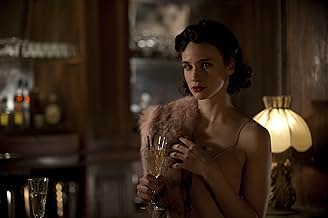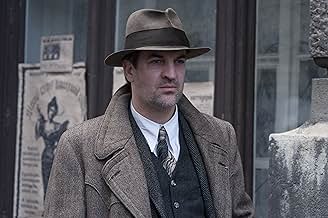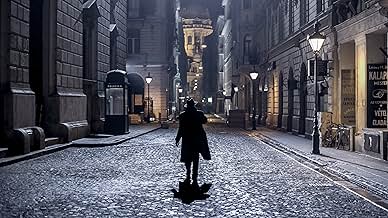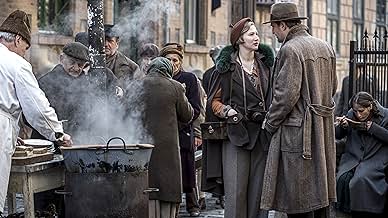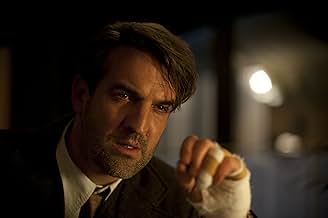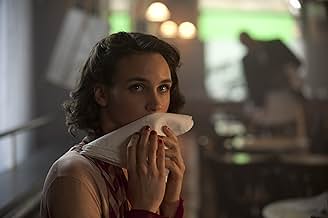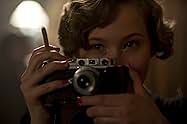Adicionar um enredo no seu idiomaA murder mystery set in Budapest, 1936. Just as Hungary was preparing to allign itself with Hitler, a young beautiful girl is found dead and no one wants to investigate - except Gordon a cri... Ler tudoA murder mystery set in Budapest, 1936. Just as Hungary was preparing to allign itself with Hitler, a young beautiful girl is found dead and no one wants to investigate - except Gordon a crime reporter who has a gut feeling that things are not what they seem.A murder mystery set in Budapest, 1936. Just as Hungary was preparing to allign itself with Hitler, a young beautiful girl is found dead and no one wants to investigate - except Gordon a crime reporter who has a gut feeling that things are not what they seem.
- Direção
- Roteiristas
- Artistas
- Prêmios
- 2 vitórias e 3 indicações no total
- Szöllõsy Fanny
- (as Törõcsik Franciska)
Avaliações em destaque
A young woman (Franciska Törocsik) is found dead on a street in the red light district, she has no means of identification apart from a Jewish prayer book. Gordon briefly encountered this woman before and is unwilling to just pass the death off as "just" the murder of a prostitute as the police are keen to do. Joined by his former lover, photographer Krisztina (Reká Tenki) he pursues the case with the determination of a detective rather than just a journalist. Krisztina is all too aware of the rising political tension and Anti-Semitism having just returned from Berlin. As the investigation continues Gordon is warned off by the formerly honest police chief Gellert (Zsolt Anger), he is beaten up by thugs, pistol-whipped by a mobster and Krisztina suffers similar indignities, for this case is bringing them closer to the higher echelons of Hungarian political and business circles.. In a scene reminiscent of Casablanca, Gordon beats up fascists in a bar who object to a "Jewish" song, he is involved in a car chase pursued by communists, yes, this is no ordinary murder. But he goes where the evidence takes him.
The Budapest of 1936 is vividly recreated by director Eva Gardos along with cinematographer Elemer Ragalyi and set designer Pater Sparrow. Tight outdoor shots in present day Budapest avoid the necessity of CGI. Beautiful interiors have been crafted with an elite nightclub providing boxing matches between women over dinner and politicians playing cards upstairs, in a high class brothel women may be chosen from a pictorial menu. This contrasts with street corner card games and bare-knuckle boxing in the streets. Adapted from the eponymous novel by Vilmos Kondor, with the screenplay written by Andras Szeker. 8/10
As always, movies introduce changes from their original books to make the movie more "movie-like", and while I understand that it is difficult to have source material that is hundreds of pages long, something has got to go, I felt that they made some significant changes that lead to a worse movie.
In the books Zsigmond Gordon is quite a nice guy. He treats his girlfriend/wife all in all pretty well. In the movie he is portrayed as a bit of a chauvinist, a womanizer. The madame at the wh**e-house was also portrayed in a very different way, in the book she was sad and lonely. And so on, there are several changes like this.
Several of the locations felt very much like shot in a studio lot, which was also a shame since it would've given much more authenticity to the movie if more was shot in Budapest. But a difficult thing to pull of, logistically. The direction and acting was stiff at times, but all in all, not bad for a Hungarian movie with a limited budget.
In any case, a watchable movie!
Couple of comments: this is the big screen adaptation of the Hungarian bestseller, reportedly the first book noir in Hungary's history. I haven't read the book so I can't comment on how close the film stays to the book (or not). What I can comment on is that, regretfully, the movie lacks on all levels. The performers act in a wooden and very staged way, and you can practically hear the director yell "and... ACTION" at the beginning of each scene. I can't recall the last time i saw a film so incredibly awkward. As to the film's "noir" element, there's a lot (and I mean, a LOT) of cigarette smoking going on... That's about the only aspect I detected as being "noir". Bottom line: at no time did I feel ever any emotional connection or involvement with the movie's characters. I should care who murdered the young woman and wonder why she was murdered, but I simply didn't...
I recently saw this film at the 2019 Jewish & Israeli Film Festival here in Cincinnati, celebrating its 30th anniversary this year. I have attended the festival for years, and most of the time the festival's planning committee does an excellent job in putting together a worthwhile and engaging program. Alas, on this one, they simply whiffed and I cannot recommend "Budapest Noir" to anyone in good conscience, sorry.
Você sabia?
- Erros de gravaçãoThere is a (beautiful ) Coffee machine, ELEKTRA Micro Casa Semiautomatica which is an espresso machine using pressure (pump) to brew coffee. The movie is set in 1936, but it's only in 1938 that Achille Gaggia started to brew espresso coffee by means of pressure through a piston system (later by mean of a pump)
- Citações
Gordon Zsigmond: Budapest. For some, it's the city of death, for others, it's the city of lights.
Principais escolhas
- How long is Budapest Noir?Fornecido pela Alexa
Detalhes
- Data de lançamento
- País de origem
- Centrais de atendimento oficiais
- Idiomas
- Também conhecido como
- Budapest Noir
- Locações de filme
- Empresa de produção
- Consulte mais créditos da empresa na IMDbPro
Bilheteria
- Orçamento
- HUF 897.382.877 (estimativa)
- Faturamento bruto mundial
- US$ 283.704
- Tempo de duração
- 1 h 35 min(95 min)
- Cor
- Proporção
- 1.85 : 1

